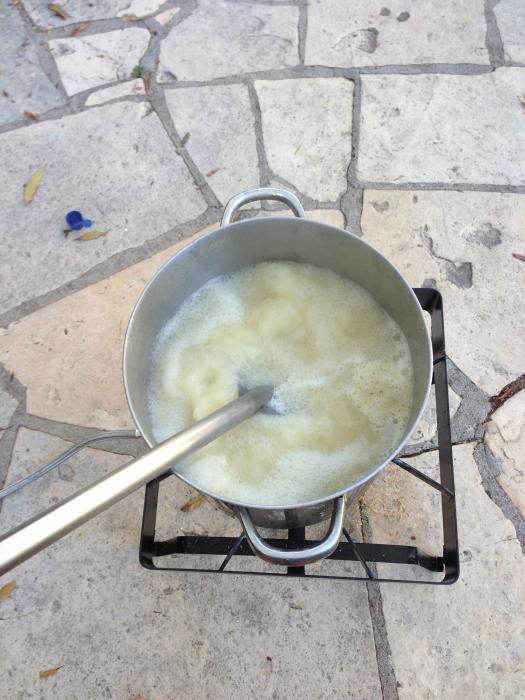mloster
Well-Known Member
Alright guys. I brewed this one today. The recipe is for a 2 gallon batch of white witbier.
Fermentables
2 lbs Millet
2 lbs Quinoa
Hops
.1 oz Northern Brewer @ 90 min (8.6 AA%)
.2 oz UK Kent Goldings @ 30 min (6.7 AA%)
.2 oz UK Kent Goldings @ 5 min (6.7 AA%)
Yeast
Safbrew WB-06
Other
.1 oz Chamomile @ 5 min
.2 oz Coriander @ 5 min
1/2 Orange worth of zest @ 5 min
For the unmalted quinoa and unmalted millet, I soaked them for ~4 hours and roasted them at 350º until they were dry and VERY lightly toasted. I ground the grains to an almost flour like consistency using a corona mill. Now the mash took the majority of the time. With 3 gallons of water, I mashed in at 122 for 15 minutes Then I raised the temp to 143, which is the average gelatinization temperature between quinoa and millet. I let it sit for 15 minutes. Then I ended up letting it sit at 180 for 15 minutes. Lastly, I boiled it for 15 minutes, stirring constantly to avoid any scorched grains on the bottom. That takes care of the cereal mash.
Then, I lowered the temperature to 120. I had some problems with the goo that resulted from the cereal mash, so I added ~2 gallons of boiling to bring the mash to 145. From there, I added ~3 tsp of diatase. I put the lid on and wrapped the pot up in an old comforter to keep the mash temperature stable. I let it sit for 2 hours. By then, the grains had released the majority of their water and I was able to strain the bag. This left me with 4 gallons of fairly sweet tasting wort.
After straining, I raised the wort to boiling and brewed as normal, adding the chamomile, coriander, and orange zest in the last 5 minuntes. The final wort was pleasantly sweet, telling me that I achieved conversion with the unmalted grains. We'll see how the final product comes out, but I have high hopes.


Fermentables
2 lbs Millet
2 lbs Quinoa
Hops
.1 oz Northern Brewer @ 90 min (8.6 AA%)
.2 oz UK Kent Goldings @ 30 min (6.7 AA%)
.2 oz UK Kent Goldings @ 5 min (6.7 AA%)
Yeast
Safbrew WB-06
Other
.1 oz Chamomile @ 5 min
.2 oz Coriander @ 5 min
1/2 Orange worth of zest @ 5 min
For the unmalted quinoa and unmalted millet, I soaked them for ~4 hours and roasted them at 350º until they were dry and VERY lightly toasted. I ground the grains to an almost flour like consistency using a corona mill. Now the mash took the majority of the time. With 3 gallons of water, I mashed in at 122 for 15 minutes Then I raised the temp to 143, which is the average gelatinization temperature between quinoa and millet. I let it sit for 15 minutes. Then I ended up letting it sit at 180 for 15 minutes. Lastly, I boiled it for 15 minutes, stirring constantly to avoid any scorched grains on the bottom. That takes care of the cereal mash.
Then, I lowered the temperature to 120. I had some problems with the goo that resulted from the cereal mash, so I added ~2 gallons of boiling to bring the mash to 145. From there, I added ~3 tsp of diatase. I put the lid on and wrapped the pot up in an old comforter to keep the mash temperature stable. I let it sit for 2 hours. By then, the grains had released the majority of their water and I was able to strain the bag. This left me with 4 gallons of fairly sweet tasting wort.
After straining, I raised the wort to boiling and brewed as normal, adding the chamomile, coriander, and orange zest in the last 5 minuntes. The final wort was pleasantly sweet, telling me that I achieved conversion with the unmalted grains. We'll see how the final product comes out, but I have high hopes.




